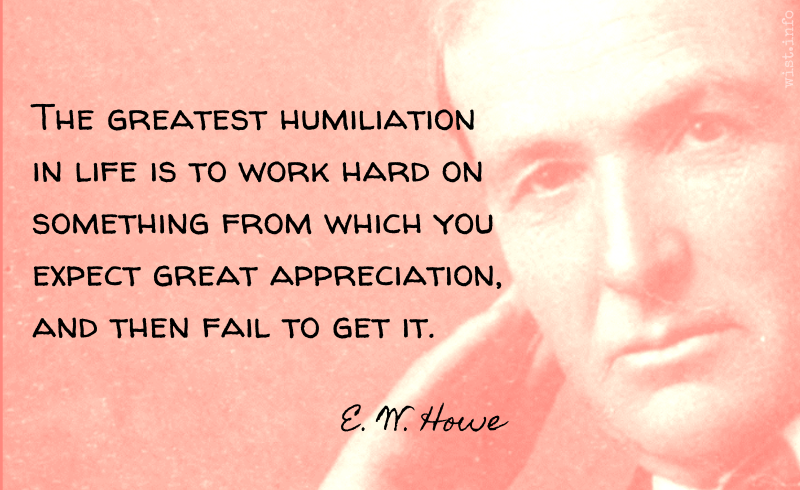Can I forget your many favours? Nay.
Why don’t I mention them? Because you do.
If I begin, some one is sure to say
“Your patron told me all he did for you”;
Friend there are tasks cannot be done by two;
Shall this be yours or mine? for I submit
However great a gift, there nothing due
To any giver who shall boast of it.[Quae mihi praestiteris memini semperque tenebo.
Cur igitur taceo, Postume? Tu loqueris.
Incipio quotiens alicui tua dona referre,
Protinus exclamat ‘Dixerat ipse mihi.’
Non belle quaedam faciunt duo: sufficit unus
Huic operi: si vis, ut loquar, ipse tace.
Crede mihi, quamvis ingentia, Postume, dona
Auctoris pereunt garrulitate sui.]Martial (AD c.39-c.103) Spanish Roman poet, satirist, epigrammatist [Marcus Valerius Martialis]
Epigrams [Epigrammata], Book 5, epigram 52 (5.52) (AD 90) [tr. Pott & Wright (1921), “Self-Praise”]
(Source)
"To Postumus." (Source (Latin)). Alternate translations:
Thy gifts to me I thinke of, and still shall.
Why then do I not speake of them at all?
Thou dost. Where ere I tell thy charitie,
Tis answer'd straight, himselfe has told it me.
This work befits not both; one is enough;
If thou wouldst have me speake, be silent thou.
For (trust me) wert thou nere so liberall,
The givers talking would destroy it all.
[tr. May (1629), ep. 53]
What thou conferr'st on me I do
Remember, and shall think on, too.
Why therefore do I hold my tongue?
Cause, Posthumus, thou ne'er hast done.
As often as I go to treat
of these thy gifts to them I meet,
'T is presently replied, "Forbear,
He whisper'd it into my ear."
Two men some things cannot do well:
One person may suffice to tell,
and do this work: if it may please
That I shall speak, then hold thy peace.
For prithee, Postumus, believe,
Though that thy gifts are great to give
All thanks must perish, and are lost,
When authors their own actions boast.
[tr. Fletcher (1656)]
Your favors to me I remember well;
But do not mention them; because you tell.
Whenever I begin, I'm answer'd strait,
"I heard from his own mouth, what you relate."
Two ill become the business of but one;
Be you but silent, I will speak alone.
Great are your gifts; but when proclaim'd around,
The obligation dies upon the sound.
[tr. Hay (1755), ep. 53]
The services you have rendered me I do not forget, and will always keep them in my mind. How happens it, Posthumus, that I am silent? It is because you talk. Do I begin to expatiate on your favours, I am told, "I heard all about it from himself." Some things are not handsomely performed by two; one person is enough to relate kindness; if you wish me to speak, you must remain silent. The merit of gifts, however great they be, is lost by the garrulity of the giver.
[tr. Amos (1858), ch. 3, ep. 78; ep. 53]
Your services to me I remember, and shall never forget Why then am I silent about them, Postumus? Because you yourself talk of them. Whenever I begin to speak to any one of your favours, he immediately exclaims, "He has told me of them himself." There are certain things which cannot be well done by two people; one is enough in this case. If you wish me to speak, keep silence yourself. Believe me, Postumus, gifts, however great, are deprived of their value by garrulity on the part of the donor.
[tr. Bohn's Classical (1859)]
I'm grateful for your favors;
They'll never be forgot.
You wonder why I'm dumb about 'em?
Just because you're not.
Whenever I start telling
Of kindnesses you'd done,
The tale, I find, you'd quite concluded
Long ere I'd begun.
Now two men spoil the business
That one does well alone.
If I 'm desired to open my mouth,
Kindly shut your own.
[tr. Nixon (1911)]
Your bounty to me I remember and shall always keep in mind. Why, then, and I silent about it, Postumus? You speak of it. As often as I begin to report to someone your presents, he at once exclaims, "He himself had told me." These are things which two persons do not do nicely: one suffices for this work' if you want me to speak, be you yourself silent. Trust me; gifts, however great, Postumus, lose their value by the chattering of the giver.
[tr. Ker (1919)]
Grateful for all your gifts I still shall be;
"Why then be silent?" Well, you speak for me.
If to a friend your kindness I report,
With, "Yes, he told me so" he cuts me short.
Some tasks are not so suitable for two,
So thank you, Postumus, I'll wait for you.
Believe me, gifts, however rich they be,
Lose all their value by loquacity.
[tr. Francis & Tatum (1924), #251]
I remember all you have done for me and shall ever keep it in mind. Why then do I say nothing about it, Postumus? You talk. Whenever I start to tell somebody of your generosity, he exclaims at once: "He tole me that himself." Some things are not nicely done by two. One is enough for this work. If you want me to talk, you must hold your tongue. Believe me, Postumus, the most magnificent of gifts are nullified by the garrulity of the giver.
[tr. Shackleton Bailey (1993)]
You are my patron, I would give you praise,
But when talk of your virtues I would raise,
I'm told you have already laid them out.
Where I would whisper, you your merits shout.
We must more prudently divide our labor
To have efficient impact on our neighbor.
If I'm to praise you, you must hold your peace,
Or give me from my gratitude release.
Your gifts do not give me the power to do
Promotion constantly undone by you.
You undermine my prized veracity
With puffings of your own loquacity.
[tr. Wills (2007)]
I'll always cherish what you’ve done for me.
Why don’t I speak of it? Because you do.
Whenever I tell someone of your bounty,
he cries at once: “He told me of it, too!”
Some things two can’t do well; just one suffices.
You must keep mum, if you want me to gush.
Believe me, Postumus, the greatest gifts
are canceled when the giver just won't hush.
[tr. McLean (2014)]
About your gifts I'd love to gush,
Instead, I feel I have to hush.
When I tell people, they don't doubt it:
You've already bragged about it.
Maybe we should coordinate
Who praises your largesse of late.
But gifts do lose their gleam and such
When givers praise themselves too much.
[tr. Hill (2023)]
Quotations about:
credit
Note not all quotations have been tagged, so Search may find additional quotes on this topic.
“Horace or Boileau have said such a thing before you.” — “I take your word for it, but I have used it as my own. May I not have the same correct thought after them, as others may have after me?”
[Horace ou Despréaux l’a dit avant vous. — Je le crois sur votre parole; mais je l’ai dit comme mien. Ne puis-je pas penser après eux une chose vraie, et que d’autres encore penseront après moi?]
Jean de La Bruyère (1645-1696) French essayist, moralist
The Characters [Les Caractères], ch. 1 “Of Works of the Mind [Des Ouvrages de l’Esprit],” § 69 (1.69) (1688) [tr. Van Laun (1885)]
(Source)
(Source (French)). Alternate translations:
Horace and Boileau have said such a thing before you. I take your word for't, but I said it as my own, and may not I think a just thought after them, as others may do the same after me?
[Bullord ed. (1696)]
HORACE or BOILEAU have said such a thing before you: I take your word for it, but I said it as my own, and may not I think a just Thought after them, as others may do the same after me?
[Curll ed. (1713)]
Horace or Boileau have said such a thing before you. I take your Word, for it, but I said it as my own, and may not I have the same just Thought after them, as others may have it after me?
[Browne ed. (1752)]
Horace or Boileau said it before you. -- I take your word for that; but I said it as my own. Cannot I, after them, have a true thought, and one which others will think after me?
[tr. Stewart (1970), § 68]
The verse is mine but friend, when you declaim it,
It seems like yours, so grievously you maim it.[Quem recitas meus est, o Fidentine, libellus:
sed male cum recitas, incipit esse tuus.]Martial (AD c.39-c.103) Spanish Roman poet, satirist, epigrammatist [Marcus Valerius Martialis]
Epigrams [Epigrammata], Book 1, epigram 38 (1.38) (AD 85-86) [tr. Pott & Wright (1921)]
(Source)
"To Fidentinus." (Source (Latin)). Alternate translations:
The Booke thou readst, O Fidentine, is mine;
But when thou ill recit'st it, it proves thine.
[tr. May (1629)]
The verses, Sextus, thou dost read, are mine;
But with bad reading thou wilt make them thine.
[tr. Harington (fl. c. 1600)]
The verses, friend, which thou hast read, are mine;
But, as thou read'st them, they may pass for thine.
[tr. Bouquet]
The verses, friend, which thou hast read, are mine;
But, as thou read'st so ill, 't is surely thine.
[tr. Fletcher (c. 1650)]
My living lays were those that you dispense:
But, when you murder them, they yours commence.
[tr. Elphinston (1782), 12.14]
O Fidentinus! the book you are reciting is mine, but you recite it so badly it begins to be yours.
[tr. Amos (1858), ch. 2, ep. 33]
With faulty accents, and so vile a tone,
You quote my lines, I took them for your own.
[tr. Halhead (fl. c. 1800)]
The book which you are reading aloud is mine, Fidentinus but, while you read it so badly, it begins to be yours.
[tr. Bohn's Classical (1859)]
The verses, friend, which thou has read, are mine;
But, as though read'st them, they may pass for thine.
[tr. Bouquet (<1879)]
You're reading my book to your friends as your own:
But in reading so badly your claim to it's shown.
[tr. Nixon (1911)]
That book you recite, O Fidentinus, is mine. But your vile recitation begins to make it your own.
[tr. Ker (1919)]
The book you read in public from
is one I wrote. But the way you moan
and mangle it turns it into your own.
[tr. Bovie (1970)]
They're mine, but while a fool like you recites
My poems I resign the author's rights.
[tr. Michie (1972)]
The little book you are reciting, Fidentinus, belongs to me. But when you recite it badly, it begins to belong to you.
[tr. Shackleton Bailey (1993)]
Fame of how badly you read it endures.
Though that's my book, just call it yours.
[tr. Ericsson (1995)]
Although the lines are mine (their worth assures) --
By badly singing them, you make them yours.
[tr. Wills (2007)]
Dear Rud, the book from which you are
giving a reading is mine
but since you read so badly
it's yours.
[tr. Kennelly (2008)]
The book that you recite from, Fidentinus, is my own.
But when you read it badly, it belongs to you alone.
[tr. McLean (2014)]
That little book you're reciting is one of mine, Fidentinus; but you're reciting it so badly, it's turning into one of yours.
[tr. Nisbet (2015)]
You ask me to recite my poems to you?
I know how you’ll “recite” them, if I do.
[tr. Burch (c. 2017)]
That verse is mine, you know, which you’re
Reciting, But you quote it
So execrably, that I believe
I’ll let you say you wrote it
[tr. Wender]
The poems thou are reading, friend, are mine;
But such bad reading starts to make them thine.
[tr. Oliver]
We do what we must, and call it by the best names we can, and would fain have the praise of having intended the result which ensues.
Ralph Waldo Emerson (1803-1882) American essayist, lecturer, poet
“Experience,” Essays: Second Series (1844)
(Source)
“Simple things are never problems,” I told her. “Unfortunate, maybe, but if it isn’t complicated, it isn’t really a problem.”
The Goddess nodded. “Very good, Vlad; I didn’t expect such wisdom from you.”
I grunted and didn’t tell her I was quoting my grandfather; I’d rather she stayed impressed.
No victor believes in chance.
[Kein Sieger glaubt an den Zufall.]
Friedrich Nietzsche (1844-1900) German philosopher and poet
The Gay Science [Die fröhliche Wissenschaft], Book 3, § 258 (1882) [tr. Kaufmann (1974)]
(Source)
Also known as La Gaya Scienza, The Joyful Wisdom, or The Joyous Science.
(Source (German)). Alternate translations:
No conqueror believes in chance.
[tr. Common (1911)]
No victor believes in chance.
[tr. Nauckhoff (2001)]
The greatest pleasure I know is to do a good action by stealth, and to have it found out by accident.
Charles Lamb (1775-1834) Welsh-English essayist
“Table Talk, by the Late Elia,” London Athenaeum (4 Jan 1834)
(Source)
There is no limit to what a man can do so long as he does not care a straw who gets the credit for it.
Charles Edward "C. E." Montague (1867-1928) English journalist, novelist, essayist
“Any Cure?” sec. 3, Disenchantment (1922)
(Source)
Montague did not take credit for the phrase, referring to it as a saying.
This was not the first time Montague used the phrase. In a memoir about journalist William T. Arnold in 1906, he stated that a phrase that "someone has said" was a particular favorite of Arnold's: "There is no limit to what a man can do who does not care who gains the credit for it."
More discussion of the quote and its origins: A Man May Do an Immense Deal of Good, If He Does Not Care Who Gets the Credit – Quote Investigator. See also Truman.
The greatest humiliation in life, is to work hard on something from which you expect great appreciation, and then fail to get it.
Edgar Watson "Ed" Howe (1853-1937) American journalist and author [E. W. Howe]
Ventures in Common Sense, “Miscellany of Life” (1919)
(Source)
As always, victory finds a hundred fathers, but defeat is an orphan.
[Come sempre, la victoria trova cento padri, e nessuno vuole riconoscere l’insuccesso.]
Galeazzo Ciano (1903-1944) Italian diplomat [Gian Galeazzo Ciano, 2nd Count of Cortellazzo and Buccari]
Diario, 9 Sep 1942 (1946)
(Source)
Alternate translation: "As always, victory will have a hundred fathers, but defeat will never be acknowledged by anyone at all."
An "old saying" quoted by John Kennedy after the Bay of Pigs fiasco. Most likely gleaned from the movie The Desert Fox (1951), where Field Marshal von Rundstedt tells Erwin Rommel “You must never forget this, my dear fellow: Victory has a hundred fathers. Defeat is an orphan.” The movie was based on the book Desmond Young, Rommel, the Desert Fox (1951), which provides a citation for the quotation.
He is aloof, as if his talk
Were priced beyond the purchasing;
But once his project is contrived,
The folk will want to say of it:
“Of course! We did it by ourselves!”Lao-tzu (604?-531? BC) Chinese philosopher, poet [also Lao-tse, Laozi]
The Way of Life, ch. 17 [tr. Blakney (1955)]
Alt. trans.:
- "A good manager is best when people barely know that he exists. Not so good when people obey and acclaim him. Worse when they despise him. But of a good leader, who talks little, when his work is done -- his aim fulfilled, they will say: 'We did it ourselves.'"
- "When the effective leader is finished with his work, the people say it happened naturally."
And while I at length debate and beate the bush,
There shall steppe in other men and catch the burdes.John Heywood (1497?-1580?) English playwright and epigrammist
Proverbes, Part 1, ch. 3 (1546)
(Source)
It is amazing what you can accomplish if you do not care who gets the credit.
Harry S Truman (1884-1972) US President (1945-1953)
(Spurious)
There is nothing contemporary to Truman indicating this is a valid quotation of his. The earliest instance of crediting Truman seems to be by Hugh Sidey in Time (7 Nov 1988).
A variant of this quote was also attributed to Ronald Reagan, apparently due to a plaque he kept in his office:
There is no limit to what a man can do or where he can go if he does not mind who gets the credit.
More discussion of the quote and its actual origins going back to 1863: A Man May Do an Immense Deal of Good, If He Does Not Care Who Gets the Credit – Quote Investigator. See also Montague.


















